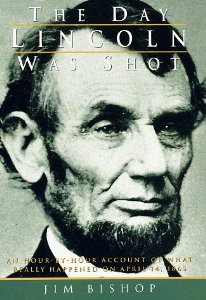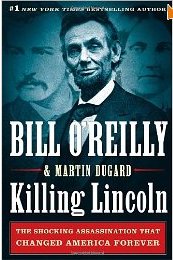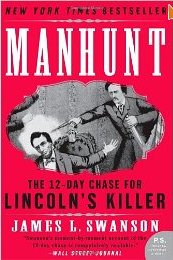My Lincoln Conspiracy Obsession
 My obsession began back in high school when I had to write one of those dreaded term papers. Except for me, of course, it wasn’t so dreaded. I actually liked writing term papers (while my friends groaned), especially when I came across fascinating books like The Day Lincoln Was Shot by Jim Bishop.
My obsession began back in high school when I had to write one of those dreaded term papers. Except for me, of course, it wasn’t so dreaded. I actually liked writing term papers (while my friends groaned), especially when I came across fascinating books like The Day Lincoln Was Shot by Jim Bishop.
If you think history is boring, you haven’t read a book like this one. (And if you’re new to the Lincoln conspiracy, this is a good place to start.) Amazon describes Bishop’s book as a “gripping, minute-by-minute account of the day President Lincoln was struck down by an assassin’s bullet in Ford’s Theatre. Parallels of the activities of the President with those of his assassin in an unforgettable, suspense-filled chronicle.” That’s a very accurate description. The first chapter is “7:00 a.m.” on April 14, 1865, and the last is “7:00 a.m.” on April 15, 1865, after Lincoln passed away.
What do you see here that might appeal to somebody who likes to write suspense? “Gripping,” “minute-by-minute account,” “assassin,” “suspense-filled.” The book’s like a countdown to a bomb going off. What’s even bigger on the suspense grid—something even the best-crafted suspense novels cannot aspire to attain—is that this is a true story. No author had to make it up. The story just needed a gifted author like Jim Bishop to write it down. Mesmerizing is the best word to describe this reading experience.
This was the book that started it all for me—the opening of my eyes to the best suspense of all. True crime in the pages of history. This fascination may have led to why I minored in history in college.
Many years later came Killing Lincoln by Bill O’Reilly. I thought I already knew all there was to know about John Wilkes Booth and his motley band of conspirators. I was wrong.
O’Reilly delivers a wonderful narrative that, while mostly a review, explores some fresh content, such as the last battle of the Civil War (which places the Good Friday assassination in its historical context), the account of John Wilkes Booth’s romantic interests (which help us understand his character better), and the jinxed search for Booth that resulted in the drowning of so many fine men in Maryland’s swamps. O’Reilly writes:
The method of searching the swamps is simple yet arduous. First, the troops assemble on the edge of bogs with names like Allen’s Creek, Scrub Swamp, and Atchall’s Swamp, standing at loose attention in the shade of a thick forest of beech, dogwood, and gum trees. Then they form two lines and march straight forward, from one side to the other. As absurd as it seems to the soldiers, marching headlong into cold mucky water, there is no other way of locating Booth and Herold. Incredibly, eighty-seven of these brave men will drown in their painstaking weeklong search for the killers.
And that leads me to my current read, yet another book for my Lincoln conspiracy collection, Manhunt: The 12-Day Chase for Lincoln’s Killer by James Swanson.
Oh my! I imagined some of the material would be repetitive after the other books I’ve read on the subject, but this is perhaps the best one yet, judging it by what I’ve read so far. (Unfortunately, I’m still reading it and will withhold my final judgment until I’m finished.)
Though the book’s focus appears to be the actual search for Booth (an amazing story in itself), Swanson gives ample coverage of the assassination, offering perhaps the most detailed account I’ve ever read. Indeed there are many details I’m reading for the first time.
The minute-by-minute account of Powell’s thwarted attempt to assassinate Secretary of State Seward in his bed, for example, is the most detailed and gripping account I’ve ever read. This book’s strength is the author’s almost painful attention to detail. It doesn’t skim the surface; it focuses in with laser precision. For example, consider the moment just before Booth pulls the trigger in Ford’s Theater. The author speculates on the president’s response had Booth’s attempt failed:
Had Booth missed, Lincoln could have risen from his chair to confront his assassin. At that moment the president, cornered, with not only his own life in danger but also Mary’s, would almost certainly have fought back. If he did, Booth would have found himself outmatched facing not kindly Father Abraham, but the aroused fury of the Mississippi River flatboatman who fought off a gang of murderous river pirates in the dead of night, the champion wrestler who, years before, humbled the Clary’s Grove boys in New Salem in a still legendary match, or even the fifty-six-year-old president who could still pick up a long, splitting axe by his fingertips, raise it, extend his arm out parallel with the ground, and suspense the axe in midair. Lincoln could have choked the life out of the five-foot-eight-inch, 150-pound thespian, or wrestled him over the side of the box, launching Booth on a crippling dive to the stage almost twelve feet below.
This is a good example of the author’s way with words and how his meticulous, detailed research contributes to the fully fleshed-out account and the masterful character development of primary characters.
My Kindle says I’m only 10 percent through this book. I’m certain to relish every paragraph.
Why my obsession with the Lincoln conspiracy?
Because the tragic true story has all the hallmarks of a great suspense tale. A lovable main character, a complex bad guy, a chilling (almost insane) murder plot, a tension-filled countdown to that fatal shot, mishaps and evidence of God’s sovereignty along the way, and the investigative journey to bring the guilty to justice (along with some mass hysteria and government overreaching).
The story is also fascinating because even after so many years and books, there are a few loose ends. Did Mary Surratt deserve to hang? What exactly was her involvement, and how much did she know? Was Secretary of War Stanton involved in the conspiracy? The Booth diary fell into his hands, then later pages were missing. Was the man shot in the barn really Booth, or did he slip away, leaving his lookalike behind to take the fall, and live the rest of his days elsewhere? Fascinating questions. No clear answers.
Truth is often stranger than fiction, and reading these books is like reading a mystery/thriller so engrossing no novelist (I don’t care who he or she is) could invent a story more compelling.
Question: What about you? Have you ever read a true story from history that was so gripping you could hardly put it down? If so, would you care to share?












Next time we meet can I borrow your copy of “The Day Lincoln Was Shot” Would like to try it. You make reading these books seem like a “must”. Mom
Hi, Mom. I’d be happy too. I have “Killing Lincoln” as well. I’m pretty sure you already read “The Day Lincoln Was Shot.”